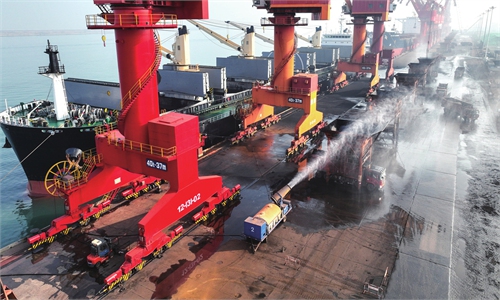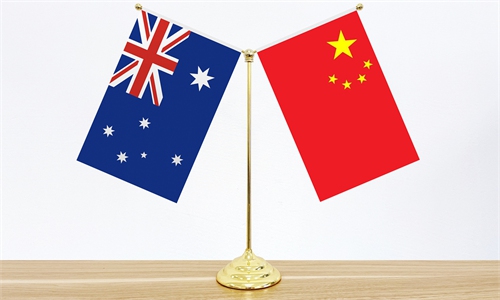
Illustration: Chen Xia/Global Times
Economic relations between Australia and China, the former's largest trade partner, are in recovery mode, with Australian wines remaining a focus. Australian Prime Minister Anthony Albanese was quoted by Reuters as saying on Tuesday that he was "very hopeful of a breakthrough" with China over wine tariffs, as a deadline for the publication of a WTO ruling is believed to be imminent.Although there were some differences and setbacks in the past, recent interactions between officials from China and Australia show that both sides share a common will to push the recovery of economic ties, and damaged relations are harmful, especially to the Australian side. It's time to correct the mistake made by the administration of former Australian prime minister Scott Morrison and push economic ties back to normal.
Morrison adopted an anti-China attitude so as to butter up the US government. It is the Australian side that has undermined normal cooperation, so Canberra should accept more responsibility and work harder to stabilize bilateral ties. Australia has launched a series of anti-dumping and anti-subsidy investigations against Chinese products. For instance, Australia announced in 2016 that it would impose import duties on certain types of Chinese steel to protect domestic steelmakers.
China is Australia's largest two-way trading partner in goods and services, accounting for nearly one-third of its trade with the world. The Australian side said it remains committed to a mutually beneficial and respectful relationship with China in which the two countries can pursue their shared interests. To undertake responsibility and strengthen mutually beneficial cooperation is not empty talk, but it does demand practical action. At the very least, Australia should stop unfair trade measures against Chinese imports and lift its anti-dumping tariffs on Chinese steel products.
While the issue of Australian wine is complicated with no easy answer, media reports show that the Chinese side is making active efforts to improve bilateral trade so that both sides can benefit from the trade of Australian wines. Cooperation is in the interests of both sides. Australia should work together with China, demonstrate sincerity and make positive efforts to push economic relations back on track, and provide a fair environment for Chinese companies and made-in-China products.
Signs indicate that China-Australia economic relations have gone through the most difficult times and regained positive momentum. We should cherish the hard-won progress and avoid backsliding. However, some Australian politicians have chosen to play dangerous games. If their actions have a negative impact on the economic recovery between China and Australia, the Australian economy will become a victim.
Speaking during a visit to South Korea, Australian Defense Minister Richard Marles said that the consequences of US-China conflict over the Taiwan island are so grave that "we cannot be passive bystanders," according to The Guardian. Although the report said Marles' comments are not a pre-commitment of Australian forces to a future war, but a call for Australia to work with its allies and partners to ensure such a conflict is prevented, it should be noted that Marles' words are extremely unacceptable. Taiwan is an inalienable part of the Chinese territory, and the Taiwan question is purely China's internal affair. Any attempt to internationalize it is a dangerous geopolitical game and a loathsome, cunning calculation.
Some Australian politicians are trying to separate economic issues from political and military ones: they hope to strengthen cooperation with China in the fields of economy and trade, while strengthening political and military alliances with the US by provoking China on core issues. Such efforts are bound to fail.
Australia should work together with China to provide enterprises with a good political atmosphere and a fair, just and non-discriminatory business environment, otherwise, business confidence is likely to be undermined by a dangerous geopolitical game that only serves US interests. China and Australia have economic complementarity. There is no reason for the two countries to be enemies and let Washington's geopolitical games interfere with economic and trade cooperation.
The author is a reporter with the Global Times. bizopinion@globaltimes.com.cn



